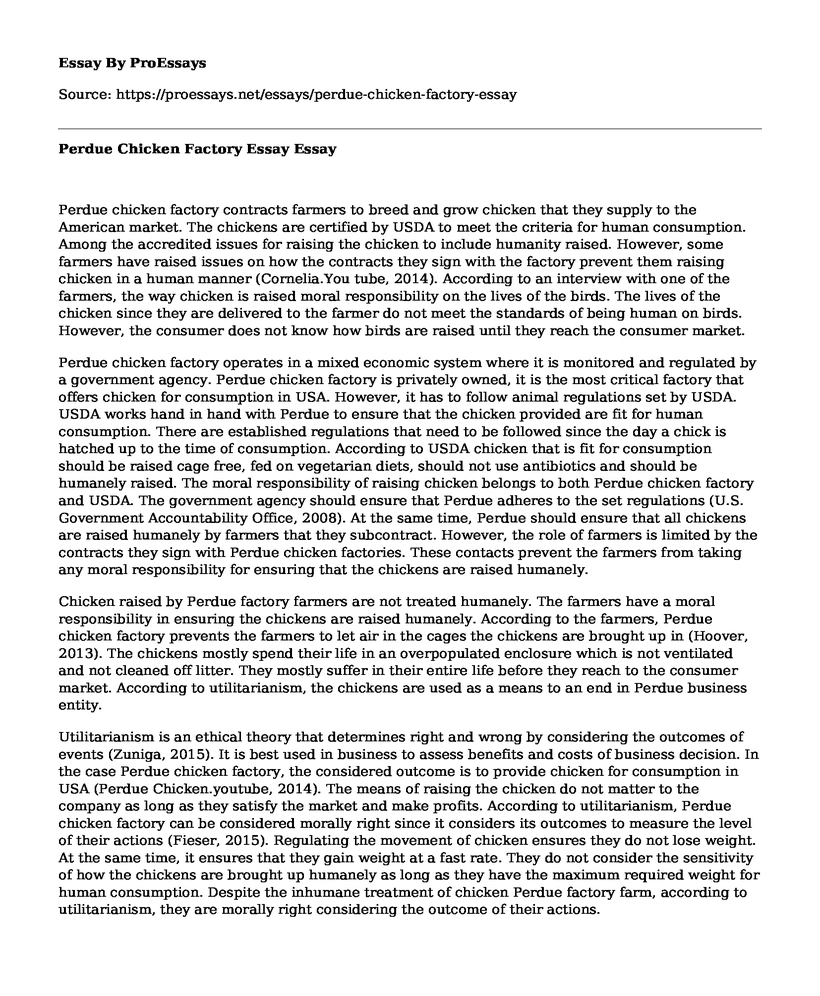Perdue chicken factory contracts farmers to breed and grow chicken that they supply to the American market. The chickens are certified by USDA to meet the criteria for human consumption. Among the accredited issues for raising the chicken to include humanity raised. However, some farmers have raised issues on how the contracts they sign with the factory prevent them raising chicken in a human manner (Cornelia.You tube, 2014). According to an interview with one of the farmers, the way chicken is raised moral responsibility on the lives of the birds. The lives of the chicken since they are delivered to the farmer do not meet the standards of being human on birds. However, the consumer does not know how birds are raised until they reach the consumer market.
Perdue chicken factory operates in a mixed economic system where it is monitored and regulated by a government agency. Perdue chicken factory is privately owned, it is the most critical factory that offers chicken for consumption in USA. However, it has to follow animal regulations set by USDA. USDA works hand in hand with Perdue to ensure that the chicken provided are fit for human consumption. There are established regulations that need to be followed since the day a chick is hatched up to the time of consumption. According to USDA chicken that is fit for consumption should be raised cage free, fed on vegetarian diets, should not use antibiotics and should be humanely raised. The moral responsibility of raising chicken belongs to both Perdue chicken factory and USDA. The government agency should ensure that Perdue adheres to the set regulations (U.S. Government Accountability Office, 2008). At the same time, Perdue should ensure that all chickens are raised humanely by farmers that they subcontract. However, the role of farmers is limited by the contracts they sign with Perdue chicken factories. These contacts prevent the farmers from taking any moral responsibility for ensuring that the chickens are raised humanely.
Chicken raised by Perdue factory farmers are not treated humanely. The farmers have a moral responsibility in ensuring the chickens are raised humanely. According to the farmers, Perdue chicken factory prevents the farmers to let air in the cages the chickens are brought up in (Hoover, 2013). The chickens mostly spend their life in an overpopulated enclosure which is not ventilated and not cleaned off litter. They mostly suffer in their entire life before they reach to the consumer market. According to utilitarianism, the chickens are used as a means to an end in Perdue business entity.
Utilitarianism is an ethical theory that determines right and wrong by considering the outcomes of events (Zuniga, 2015). It is best used in business to assess benefits and costs of business decision. In the case Perdue chicken factory, the considered outcome is to provide chicken for consumption in USA (Perdue Chicken.youtube, 2014). The means of raising the chicken do not matter to the company as long as they satisfy the market and make profits. According to utilitarianism, Perdue chicken factory can be considered morally right since it considers its outcomes to measure the level of their actions (Fieser, 2015). Regulating the movement of chicken ensures they do not lose weight. At the same time, it ensures that they gain weight at a fast rate. They do not consider the sensitivity of how the chickens are brought up humanely as long as they have the maximum required weight for human consumption. Despite the inhumane treatment of chicken Perdue factory farm, according to utilitarianism, they are morally right considering the outcome of their actions.
References
Fieser, J. (2015). Introduction to business ethics.
Carman, N. (2009, March 30). Hydrogen sulfide needs hazardous air pollutant listing under CAA Title II.
Heinzen, T., Frantz, T., Nivens, J., Kimbrell, G., Jarrett, J., Malott, M., ... Edwards, S. (2011). Petition for the regulation of ammonia as a criteria pollutant under clean air act sections 108 and 109 [Citizen petition to the U.S. Environmental Protection Agency
Hoover, J. (2013). Can't you smell that smell? Clean air act fixes for factory farm air pollution. Stanford Journal of Animal Law and Policy, 6, 1-29.
Perdue Chicken. (2014, August 1). Perdue cartoon commercial-Fresh taste. Retrieved from https://youtu.be/jz2jkpN_DGo
Truth-Worx Cornelia. (2014, January 16). Chicken factory farmer speaks out. Retrieved from https://youtu.be/YE9l94b3x9UU.S.
Government Accountability Office. (2008). Concentrated animal feeding operations: EPA needs more information and a defined strategy to protect air and water quality from pollutants of concern.
Zuniga y Postigo, G. (2015). The moral good in three traditional ethical theories.
Cite this page
Perdue Chicken Factory Essay. (2022, May 09). Retrieved from https://proessays.net/essays/perdue-chicken-factory-essay
If you are the original author of this essay and no longer wish to have it published on the ProEssays website, please click below to request its removal:
- Dunkin' Donuts Analysis Paper Example
- Living in the Country vs. The City Essay
- Vertical Farming and Air Pollution
- The Benefits of Converting to Renewable Energy and Away from Fossil Fuels
- Hurricane Katrina and Its Effects Essay
- Essay Example on HR Management: Ensuring Compliance for Organizational Success
- Essay Example on The Founder: The Story of Roy Kroc & MacDonald's







